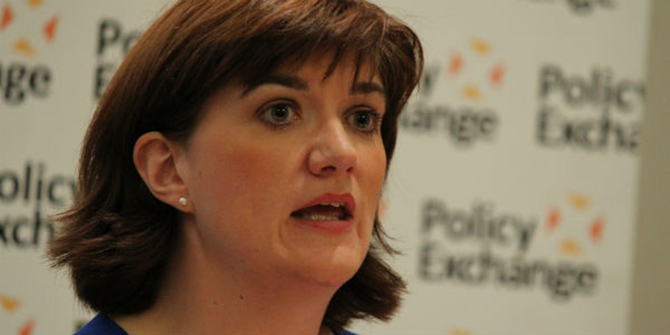 After two and a half decades of marketization, Pauline Allen argues that the attitudes of NHS managers towards competition in our health services are changing. Whilst in general NHS managers remain committed to co-operation and collaboration, pockets of pro-competitive thinking are present. However, a lack of clear policy direction leaves many managers preoccupied first of all with preserving their own organisation’s interests and identities.
After two and a half decades of marketization, Pauline Allen argues that the attitudes of NHS managers towards competition in our health services are changing. Whilst in general NHS managers remain committed to co-operation and collaboration, pockets of pro-competitive thinking are present. However, a lack of clear policy direction leaves many managers preoccupied first of all with preserving their own organisation’s interests and identities.
The publicly funded, free at the point of use NHS has been described as the UK’s ‘national religion’. Its significance in our national consciousness underlined by its prominence in the opening ceremony of the 2012 London Olympics. Even Mrs Thatcher – whose government enthusiastically privatised many public enterprises such as telephones and utilities – maintained a rhetorical commitment to its ideals. Ongoing sensitivities surrounding the financing and management of the NHS are nicely illustrated by the current debates surrounding the Labour Party leadership contest, with ‘privatising the NHS’ used as a stick which to beat Owen Smith.
In spite of this rhetorical appeal to public-sector purity, a form of marketization was introduced into the NHS as long ago as the 1990s and continues to affect the NHS today, having been maintained and extended by the Labour governments of Blair and Brown. Usually called a ‘quasi market’ because patients do not have to pay when they use health services, NHS agencies are instead allocated money by the government which they spend on behalf of their local populations. Since the latest re-organisation of the NHS under the Health and Social Care Act 2012 (HSCA 2012), these ‘commissioners’ or ‘purchasers’ are known as ‘clinical commissioning groups’ (CCGs), and are led by local general practitioners (GPs), with the help of professional managers.
Although the NHS is still funded out of taxes and is still free at the point of use, hospitals and other providers of healthcare are constituted as semi-independent entities. These are known, confusingly, as ‘trusts’, even though they have nothing to do with the legal definition of a trust, and, although wholly state owned, they are expected to compete with each other for patients. The quasi market is structured so that the amount of money each trust earns should depend on the number of patients it treats. The idea is that market forces (i.e. competition) will encourage improvements in quality of care and improve value for money.
Yet this competition between state-owned providers does not tell the whole story of NHS competition. Alongside NHS trusts, successive governments (including New Labour) have encouraged non-state organisations to enter the quasi market and offer care to NHS funded patients. This includes for- profit firms, and also various forms of third sector organisations, such as social enterprises and charities. This is the ‘privatisation’ against which many are currently campaigning, taking the view that the HSCA 2012 has made a fundamental change to the NHS by attempting to enshrine the need for competition in law, and widening the opportunities for for-profit companies.
And so over the past two-and-a-half decades, the structures of the NHS and the rules governing its operation have undoubtedly shifted in the direction of greater marketisation. At the same time, there has been ongoing debate about the extent to which this marketisation has also permeated the mind-sets of NHS managers and healthcare professionals. One view is that there is a lack of fit between the enduring underlying values of the NHS, such as the focus on individual patients and seeing the NHS as a common enterprise (as celebrated in the Olympic opening ceremony), which encourage collaborative approaches, and the formal rules of commissioning which push for greater marketisation of relationships in the health system. Other researchers have found that the longstanding ‘clan’ culture in the NHS, bonded by loyalty and tradition, has been overtaken by a ‘rational’ culture bonded by competition and emphasis on winning market share.
Marketisation and management culture in the NHS
To find out if NHS culture is changing, our recent research investigated the views of managers about competition in the NHS after the enactment of the HSCA 2012 to examine the extent to which marketisation has become an internalised feature of NHS commissioning practices, and explore how far this is actually changing the NHS in any fundamental way. We investigated the views on competition of senior managers in both providing and commissioning organisations in four local health economies in England; focusing on managers is key to detecting any ‘real’ shifts in the NHS culture, because they hold the power of either translating structural changes into changes in behaviour or hampering such changes.
We found evidence that marketisation has become embedded in the thinking of some NHS managers, however, rather than a wholesale shift in attitudes, this seems to reflect creative incorporation of some market principles into everyday commissioning work – and such work still mostly seems to favour collaborative rather than competitive approaches.
Commissioners and providers (including non-state providers) found the rules introduced by the HSCA 2012 confusing, hard to follow and potentially contradictory. Instead of a shared understanding of the rules, there was a shared sense of confusion, leading to divergent interpretations and organisational responses. A lack of clear policy direction and changing policy emphasis were also noted as the government made a series of policy announcements which appeared to change the direction of competition policy in the NHS without actually repealing the legislation promoting competition.
There also existed a whole spectrum of underlying opinions about the place of competition in the NHS. Although most interviewees preferred collaboration as a main method of solving local service delivery problems, especially in cases of complex service transformations, this was not the only attitude encountered. Some pointed out the benefits of competition when used in a non-prescriptive, creative way. This suggests that, notwithstanding the strong commitment to a ‘public’ NHS amongst NHS patients and staff, some NHS managers have internalised the idea of a more pluralistic NHS. In the face of contradictory and ambiguous rules, participants were preoccupied first of all with preserving their own organisation’s interests and identities.
Overall, this suggests that, whilst in general NHS managers remain committed to co-operation and collaboration, two and a half decades of marketisation have introduced pockets of pro-competitive thinking. The outstanding question is how the changes which are starting to occur in NHS managers’ attitudes will affect our NHS; will the common NHS identity expressed by Danny Boyle at London 2012, which has successfully supported the delivery of care to all citizens regardless of ability to pay, withstand this shift in attitudes?
Note: this paper draws from research published in Public Administration and co-authored with Dorota Osipovic (lead author), Elizabeth Shepherd, Lorraine Williams, Marie Sanderson, Anna Coleman, Neil Perkins and Katherine Checkland.
 Pauline Allen is Professor of Health Services Organisation at the London School of Hygiene and Tropical Medicine and deputy director of the National Institute for Health Research funded national Policy Research Unit in Commissioning and the Healthcare System (PRUComm)
Pauline Allen is Professor of Health Services Organisation at the London School of Hygiene and Tropical Medicine and deputy director of the National Institute for Health Research funded national Policy Research Unit in Commissioning and the Healthcare System (PRUComm)








The depth of analysis needs to cover not only the NHS market but the interpenetration of the private black market.
In the good old days (not) before the NHS internal market the lack of internal incentives led to poor quality NHS services and a flourishing black market.
There was never a golden age of collaboration and co-operation. There was a cosy stand off where managers asked for more money and the doctors exploited the fact the politicians didn’t give it.
The internal market destabilised this but there are always managers who hanker after the cetainties of the past.
The reason that collaboration is still favoured is because, for all but the simplest health issues, competition is impractical. Managers know this.
If a patient requires a simple hip replacement, local providers can theoretically compete. Unfortunately for the NHS, the playing field is far from level because private providers can enter this particular market without having to manage the necessarily-inefficient elements of healthcare that the NHS must deliver (like fully staffed emergency care, available 24/7 regardless of demand). This disparity is often why private entrants to the market can offer seemingly cheaper care to commissioners.
However, as soon as patients become more complex, competition falls down completely and collaboration is the only way. A hip replacement patient who is frail or obese or has other co-morbidities would be excluded from treatment by the private provider, which is only interested in cheap, mechanistic procedures which can be done cheaply as on a production line. Private providers are also incapable of treating such patients even if they did want to. They don’t have the specialist skills or facilities. Only local NHS providers do.
Competition dogma will never fully work for the NHS.
The marketisation of the NHS is the main reason for the fiscal problems that the NHS faces ended there was never any reason for it ito be implemented and its viability has been questionable since day one when the first trusts were created. It has lead to the proliferation of unnecessary bodies, and creates so-called bed blockers because of not being able to get the treatments that used to be provided no matter where you were. The best way forwards is to repeal the 2012 act and get rid of monitor CCG’s CQC and the other bodies and return to district health authorities who ran the service well instead of the creeping privatisation currently being enforced.